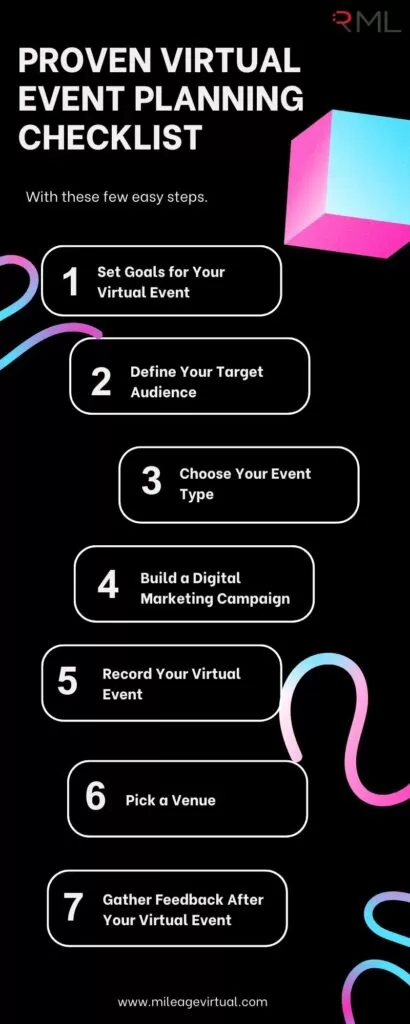
Your Complete Handbook to Virtual Event Planning[Checklist included]
Are you looking to plan a virtual event but not sure where to start? Don’t worry, we’ve got you covered! In this complete handbook, we will walk you through the entire process of virtual event planning, from identifying your audience to promoting your event.
Plus, we have included a handy checklist to ensure you don’t miss a single detail. So let’s dive in and make your virtual event a huge success!
10 Types of Virtual Events That You Don’t Know that Works in 2023
Virtual events have come a long way and offer a wide variety of options for every occasion. In 2023, there are 10 types of virtual events that are gaining popularity and will leave your attendees impressed:

- Virtual Conferences: Bring together industry experts and keynote speakers for informative sessions.
- Virtual Trade Shows: Showcase products and services to a global audience.
- Virtual Workshops: Provide hands-on training and interactive learning experiences.
- Virtual Networking Events: Connect professionals from different industries for valuable connections.
- Virtual Product Launches: Unveil new products or services with a captivating digital experience.
- Virtual Galas and Fundraisers: Raise funds for a cause while engaging donors through an online platform.
- Virtual Team Building Activities: Boost morale and strengthen team bonds remotely.
- Virtual Concerts and Performances: Bring live entertainment to audiences in the comfort of their homes.
- Virtual Exhibitions: Showcase artwork, photography, or any visual medium in a virtual gallery.
- Virtual Weddings: Celebrate love and unity with friends and family, regardless of physical location.
These virtual event options open up new possibilities and can be tailored to suit your specific needs and objectives. The key is to choose the type that best aligns with your event goals.
Here are Proven virtual event planning checklist
When it comes to virtual event planning, having a checklist can be a lifesaver. Here is a proven checklist to keep you organized and ensure nothing falls through the cracks:

By following this checklist, you can stay organized and ensure that every aspect of your virtual event is carefully planned and flawlessly executed.
Set Goals for Your Virtual Event
Every successful event starts with clear goals and objectives. Determine what you want to achieve through your virtual event. Are you aiming to generate leads, increase brand awareness, drive product sales, or educate your audience?
Once you define your goals, break them down into specific, measurable, attainable, relevant, and time-bound (SMART) objectives. This will provide clarity and direction throughout the planning and execution process of your virtual event.
Define Your Target Audience
Understanding your target audience is crucial for tailoring your virtual event to their needs and interests. Take the time to gather demographic information, preferences, and pain points related to your event topic or industry.
Use this information to create audience personas that represent different segments of your target audience. This will help you design event content, choose the right speakers, and select marketing channels that resonate with your ideal attendees.
Choose Your Event Type
The type of virtual event you choose will depend on your objectives, target audience, and available resources. Virtual events can take various forms, including webinars, workshops, conferences, panel discussions, and networking sessions.
Consider the format that aligns best with your event goals and audience preferences. Are they looking for a more interactive experience or a series of informative sessions? Adapt your event type to meet their expectations and deliver value.
Build a Digital Marketing Campaign
Effective digital marketing is essential for promoting your virtual event and driving registration. Develop a comprehensive marketing campaign that utilizes various channels such as social media, email marketing, content marketing, and online advertising.
Create engaging content that highlights the benefits of attending your event. Leverage social media platforms to build excitement and generate buzz. Craft compelling email invitations and newsletters to target your audience directly. Collaborate with influencers or industry partners to expand your reach and attract new attendees.
Remember to track and measure your marketing efforts to evaluate their effectiveness and make necessary adjustments along the way.
Record Your Virtual Event
One of the advantages of virtual events is the ability to record them for future use. Recording your event allows you to repurpose the content, reach a wider audience, and offer on-demand access to attendees who may have missed certain sessions.
Ensure you have the necessary equipment and software to capture high-quality audio and video. Inform your speakers and attendees beforehand about the recording process and obtain any necessary permissions. Once the event is recorded, edit and package the content for future distribution.
Pick a Venue
While virtual events don’t require a physical venue, choosing the right virtual event platform is essential. Look for a platform that offers a user-friendly interface, interactive features, and customizable branding options.
Consider the technical capabilities of the platform, such as the number of attendees it can support, the quality of video streaming, and its compatibility with various devices. Test the platform thoroughly before the event to ensure a seamless experience for both organizers and attendees.
Gather Feedback After Your Virtual Event
Don’t forget to collect feedback from your attendees after the virtual event. Their insights and opinions can provide valuable information for improving future events.
Send out surveys or questionnaires to gather feedback on different aspects of the event, such as content quality, speaker effectiveness, technical issues, and overall satisfaction. Analyze the feedback and identify areas of improvement.
Use this feedback to refine your event planning and ensure that each subsequent virtual event is better than the last.
Virtual event planning may seem daunting at first, but with proper organization and attention to detail, you can create a memorable and impactful experience for your attendees. Remember to refer back to the checklist provided throughout your planning process to stay on track. So go ahead, plan your virtual event, and watch it unfold into a resounding success!
Ready to plan your virtual event? Get started today and make your mark in the digital landscape!
